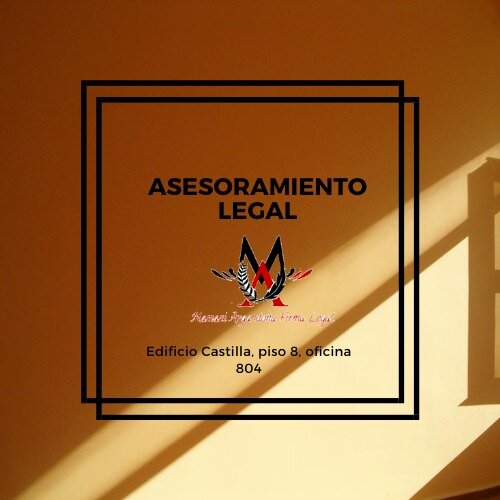Best Merger & Acquisition Lawyers in La Paz
Share your needs with us, get contacted by law firms.
Free. Takes 2 min.
List of the best lawyers in La Paz, Bolivia
About Merger & Acquisition Law in La Paz, Bolivia
Merger and Acquisition (M&A) law in La Paz, Bolivia, involves the processes and regulations surrounding the consolidation of companies or assets. This field of law is especially relevant in Bolivia, given its dynamic economic environment and the prevalence of mining, energy, and manufacturing industries. M&A activities can involve extensive legal frameworks to ensure that all corporate, tax, and employment laws are adhered to. In La Paz, the M&A landscape is characterized by both domestic and cross-border transactions, which may involve complex legal implications, necessitating strong local expertise to navigate successfully.
Why You May Need a Lawyer
Engaging in M&A can be a complicated and time-consuming process, involving considerable financial stakes and risk. Here are some situations where legal assistance could be essential:
- Due Diligence: Proper examination of financial, legal, and operational activities is crucial.
- Negotiation: Experienced lawyers can facilitate effective deal negotiation, ensuring favorable terms.
- Compliance: Lawyers ensure that all transactions comply with Bolivian legal standards, including antitrust and labor laws.
- Dispute Resolution: Lawyers can help manage and resolve conflicts that may arise during or after the transaction.
- Contract Drafting: Legal professionals draft precise and enforceable agreements to protect client interests.
Local Laws Overview
There are several key legal considerations specific to M&A in La Paz, Bolivia, including:
- Anti-monopoly Regulations: Bolivia enforces strict competition laws to prevent monopolistic behavior.
- Taxation: M&A transactions must consider various local tax implications, including transfer taxes and capital gains tax.
- Employment Law: Any M&A activity affecting labor patterns must comply with Bolivian employment law, which emphasizes job security and workers' rights.
- Environmental Regulations: Especially relevant for industries like mining and energy, M&A deals must comply with national environmental protection standards.
- Foreign Investment Laws: Regulations affecting cross-border transactions, including repatriation of profits and foreign capital inflows.
Frequently Asked Questions
What is the typical timeline for completing an M&A transaction in La Paz?
The timeline can vary based on transaction complexity, regulatory approvals required, and due diligence processes. Generally, it can take from several months to over a year.
Are there restrictions on foreign ownership of companies in Bolivia?
Yes, there are certain sector-specific restrictions on foreign ownership, especially in industries deemed critical to national interest, such as energy and natural resources.
How does due diligence in Bolivia differ from other regions?
Due diligence must account for unique local factors, including compliance with Bolivian-specific regulations, understanding indigenous rights issues, and assessing local tax obligations.
Can existing contracts and agreements be renegotiated during an M&A?
Yes, contracts can potentially be renegotiated, but it often requires mutual consent and careful legal scrutiny to ensure new terms comply with Bolivian laws.
What role does the Bolivian government play in M&A transactions?
The government may intervene, particularly regarding foreign investments, antitrust considerations, and in sectors affecting national security.
What are the risks of not conducting adequate due diligence?
Insufficient due diligence can lead to unexpected liabilities, non-compliance with laws, and greater financial risks post-acquisition.
How are regulatory violations penalized in Bolivia?
Penalties can include fines, revocation of business licenses, or enforced divestitures, depending on the severity of the violation.
What happens if M&A deals are challenged by third parties in Bolivia?
Third-party challenges can lead to legal scrutiny, potential renegotiations, or court cases to resolve disputes and enforce agreements.
Are there local incentives for companies considering mergers or acquisitions?
Bolivia occasionally offers incentives, such as tax benefits or streamlined regulatory processes, especially in sectors aligned with national development goals.
How does local culture impact M&A negotiations?
Cultural considerations, including negotiation styles and communication practices, play a significant role and can influence the outcome of negotiations.
Additional Resources
For those seeking further information on M&A in Bolivia, consider reaching out to the following resources:
- Ministry of Economy and Public Finance of Bolivia: Provides official regulations and economic guidance.
- Bolivian Chamber of Commerce: Offers information on business practices and economic opportunities.
- Legal Firms Specializing in M&A: Extensive local knowledge and expertise specific to business law.
- Bolivia’s Competition Authority: Insights into competition rules and antitrust regulations.
Next Steps
If you need legal assistance in an M&A transaction in La Paz, Bolivia, consider taking these steps:
- Research and contact law firms with a strong track record in M&A.
- Set up initial consultations to discuss your needs and understand potential legal strategies.
- Prepare necessary documentation and financials to facilitate a thorough evaluation by your legal counsel.
- Stay informed about any changes in relevant legislation or regulatory practices.
Professional legal advice can significantly enhance your likelihood of a successful M&A transaction in Bolivia, safeguarding your interests and ensuring compliance with local laws.
Lawzana helps you find the best lawyers and law firms in La Paz through a curated and pre-screened list of qualified legal professionals. Our platform offers rankings and detailed profiles of attorneys and law firms, allowing you to compare based on practice areas, including Merger & Acquisition, experience, and client feedback.
Each profile includes a description of the firm's areas of practice, client reviews, team members and partners, year of establishment, spoken languages, office locations, contact information, social media presence, and any published articles or resources. Most firms on our platform speak English and are experienced in both local and international legal matters.
Get a quote from top-rated law firms in La Paz, Bolivia — quickly, securely, and without unnecessary hassle.
Disclaimer:
The information provided on this page is for general informational purposes only and does not constitute legal advice. While we strive to ensure the accuracy and relevance of the content, legal information may change over time, and interpretations of the law can vary. You should always consult with a qualified legal professional for advice specific to your situation.
We disclaim all liability for actions taken or not taken based on the content of this page. If you believe any information is incorrect or outdated, please contact us, and we will review and update it where appropriate.










